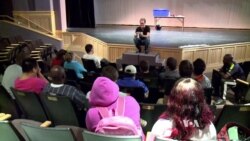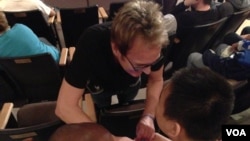Kevin Spencer saw his first magician perform when he was five years old. He remembers vividly telling his mother, ”When I grow up, I’m going to be a magician.”
He has been a magician for more than 30 years, performing on stages around the world with his wife, Cindy, bringing tricks and magical illusions to millions of people.
But early in his career, a bad car accident changed the focus of his work.
“The car I was in was crushed by a tractor trailer,” he recalled. “I woke up in neurological intensive care with a closed brain injury and a lower spinal cord injury and spent almost a year in therapy just trying to regain the skills I’d lost as a result of the accident.”
Magic as therapy
Spencer's personal struggle made him think about using magic tricks as a tool for therapy. So he teamed up with a group of professional therapists to explore the option. “What we found is that each one of the magic tricks that we teach in our program helps accomplish all those same therapeutic goals that are found in more traditional forms of therapy,” he said.
So he started conducting workshops all over the world, teaching magic tricks to children and adults with varying degrees of disabilities. During the 50-minute session, participants learn and master several magic tricks, and then perform them in front of the group.
The workshops are designed to address three key areas that can be found in traditional forms of therapy: dexterity, motivation and social skills.
Spencer explains that tricks involving foam balls and paper clips, for example, work on fine motor dexterity and eye-hand coordination, and many tricks also involve gross motor coordination. Just as importantly, he adds, it’s the motivation kids feel to learn tricks that makes magic therapy successful for them.
“If you go to a child and say ‘I need you to do this move 10 times every day for the next week,' they might do it a couple of times but they’re certainly not going to do it 10 times a day for a week,” he said. “But if I can find a magic trick that uses this move, then they’re going to go home and they’re going to practice that magic trick over and over and over again.”
And once the students master the tricks, they are eager to show it off. That helps them develop their social skills, Spencer says, which in turn, helps their self-confidence.
That makes magic therapy an all-inclusive, holistic approach to developing motor skills, cognitive skills, perceptual skills and social skills, he concludes. "And when you’re done, you actually have a really cool magic trick you can show somebody.”
Feeling 'wizardy'
Liam Shannon, 10, has a form of autism. Mastering a few simple tricks like making a pair of red foam balls magically move from one hand into the other brought out a variety of emotions.
“It made me feel ‘wizardy’,” he said with a gleeful smile, “serious, happy, proud…. it was great!”
His mother, Gita Maitra, says it was clear that the workshop had made her son feel good about himself.
“Because he realized he had accomplished something. He’d seen it, he observed it, he learned it, and he did it,” she said, adding, it made her feel good, too.
The American Occupational Therapy Association has recognized the use of magic tricks as an authentic method for achieving therapeutic goals, but beyond the physical benefits, Spencer says seeing kids like Liam come alive during a workshop is the best magic of all.
“We can be on a stage and get the applause of thousands of people, and that is nothing compared to the smile that comes across a kid’s face and when they say ‘Look! I did it’ and it’s like, yeah, you did!”
Spencer plans to devote more and more of his time with people with disabilities, to help them discover their inner wizard.






